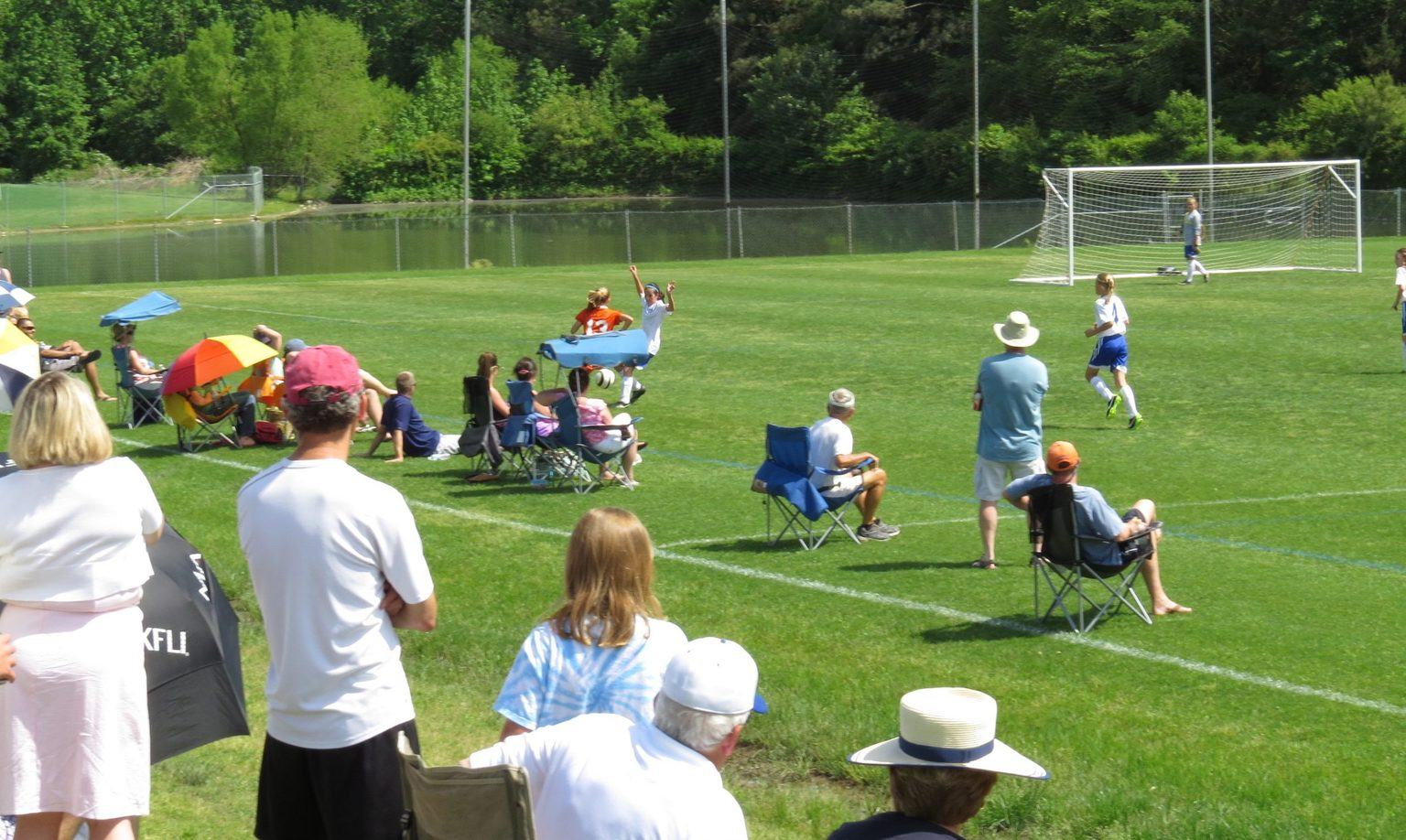Parent coaches lead an overwhelming 90% of volunteer-directed youth sports teams that include their own children. This creates a complex dynamic in youth soccer development. Young players actually prefer less parental intervention, even though parents naturally want to support their children’s progress.
Parental behavior’s effects ripple beyond individual players throughout soccer programs. Hostile sidelines, charged by overenthusiastic parents, push many youth referees to abandon the sport. Players tend to excel in soccer academy environments when parents emphasize praise and understanding instead of pressure. The key to successful youth soccer development lies in striking the right balance between supportive participation and giving young players space to grow independently on the field.
Common Mistakes Parents Make at Soccer Games
Parents often cross boundaries with their sideline behavior at youth soccer matches. This can hold back their children’s development. A study shows that 134 tactical instructions were yelled from the sideline by parents and coaches in just 40 minutes of a single Under-8 match.
Sideline coaching during matches
Young players get confused when they hear different instructions from multiple sources at once. Research shows that kids lose their problem-solving and decision-making skills when parents constantly direct them from the sideline. They end up looking at their parents for guidance instead of building their own game awareness and soccer intelligence.
Criticizing referee decisions
Referee abuse is the biggest problem in youth soccer development. The numbers tell a shocking story – 94.2% of referees reported experiencing verbal abuse while officiating. Young referees aged 14-20 say they face abuse “every few games,” mostly from coaches and parents.
This behavior does more damage than you might think. Young officials feel stressed before games because they worry about facing hostile parents again. All the same, what’s really worrying is that many young referees think about quitting because of the abuse they face.
Post-game analysis overload
Too much post-game analysis might be the most harmful thing to youth soccer development. Players feel overwhelmed when their parents pick apart every detail after matches. Young athletes say they already know their mistakes and would rather process the game on their own.
Kids respond better to praise than criticism – that’s what the research shows. More and more soccer academies now believe simple words like “I love to watch you play” work better than breaking down every play.
To promote positive youth soccer development, experts suggest parents should:
- Focus on effort and enjoyment rather than performance
- Let coaches handle the tactical instruction
- Stay supportive whatever the match result
Parents can better support their children’s soccer experience by understanding these common mistakes. This creates an environment where kids can develop skills naturally and keep enjoying the game.
How Pressure Affects Youth Soccer Players
“Young players need freedom of expression to develop as creative players. They should be encouraged to try skills without fear of falling.” — Arsène Wenger, Longest-tenured and most successful manager in Arsenal FC history
Research shows that too much pressure in youth soccer affects players’ mental health and how they play on the field. Studies found that 70% of young athletes drop out of organized sports by age 13. The main reason? They stop enjoying the game because of too much pressure.
Impact on decision making
Pressure takes a toll on young players’ thinking abilities during games. Players who try to be perfect have 56% reduced odds of making optimal decisions compared to others who feel more relaxed. Research shows that players struggle with focus when they don’t have ways to handle pressure.
This mental disruption results in:
- Players can’t read game situations well
- They react slower under pressure
- They struggle with quick decisions
Pressure creates what sports psychologists call “paralysis by analysis” – players start overthinking moves that should come naturally. Research proves that athletes training more than 17.5 hours per week have 2.29 times higher odds of experiencing poor decision-making. Mental fatigue and pressure are the culprits.
Fear of making mistakes
Fear of mistakes holds back youth soccer development. Studies reveal that 68% of elite youth athletes experience clinically relevant depressive symptoms. Performance pressure and fear of failure are the root causes.
Of course, this fear shows up differently at various ages. Young athletes between 15-16 experience 13.2% higher levels of psychological distress, while male players show only 3.6%. Research also points out that new players face more pressure and controlling behavior than experienced ones.
The effects of fear go beyond the field. Scientists found that young athletes who tie winning to their self-worth experience:
- More anxiety before games
- Higher sports-related stress
- Greater risk of burnout
Sports academies now understand that pressure affects both performance and player growth over time. Studies indicate that 82% of national governing body athletes still say that “having fun” is vital to their sports journey. This highlights why we need to balance competitive growth with enjoyment.
The Right Way to Support Soccer Development
Young soccer players thrive in supportive environments. Research shows players perform better and feel more satisfied when parents praise and understand them.
Creating a positive environment
The foundation of a positive atmosphere comes from a simple truth: 82% of youth athletes prioritize enjoyment over performance. Successful soccer academies create environments where players feel supported without excess pressure. Young athletes show 31% higher levels of intrinsic motivation when their parents demonstrate praise and understanding.
Sports psychologists say positive reinforcement should target:
- Effort and personal improvement
- Learning from mistakes
- Team collaboration
- Individual growth mindset
Letting coaches do their job
Parents want their children to succeed. Yet research shows coach autonomy is a vital part of player development. Coaches with complete tactical authority see 47% better skill progression in their players. Soccer programs now implement clear communication guidelines between parents and coaches.
Successful soccer academies have structured channels for parent-coach interaction. Programs that run regular parent education sessions experience 43% fewer sideline disruptions. These guidelines help you retain control while keeping parents informed about their child’s progress.
Supporting without interfering
The right balance between support and independence makes all the difference in youth soccer development. Players show 28% higher satisfaction with moderate parental involvement compared to too much or too little involvement.
Research shows effective support needs:
- Consistent positive reinforcement
- Respect for coach decisions
- Space for players to solve problems independently
- A stress-free environment for learning and growth
Sports psychologists find children stay in soccer longer when parents strike this balance. Players with supportive yet non-interfering parents are 62% more likely to continue playing through their teenage years.
Successful soccer academies encourage parents to focus on long-term development instead of quick wins. This approach shows 41% higher retention rates in youth soccer programs.
What Top Soccer Academies Tell Parents
Soccer academies in North America have changed their approach to parent involvement. They now use complete communication protocols and education programs. Research found that 90% of academies lacked formal parent education systems. This led to a complete overhaul in how these institutions work with families.
Communication guidelines
The best soccer academies focus on well-laid-out parent-coach interaction through proper channels. Programs that use clear communication protocols see 43% fewer sideline disruptions and 31% higher player retention rates.
These protocols include:
- Pre-season orientation meetings outlining expectations
- Monthly progress updates through designated channels
- Scheduled consultation windows to address concerns
- Clear boundaries about game-day communication
Academies found that there was a difference when parents understood their role. These parents are 62% more likely to maintain appropriate boundaries through proper communication channels. Research shows that clubs giving regular updates about training objectives see 28% higher parent satisfaction rates.
Parent education programs
Parent education has become the life-blood of elite youth soccer development. Studies show that academies with structured parent education programs see 56% fewer incidents of inappropriate sideline behavior and 41% improved coach-parent relationships.
These programs go beyond simple orientation sessions. Modern academy approaches now use ongoing education through multiple channels. This results in 73% better understanding of development pathways. Academies that use complete parent education initiatives report 47% higher player satisfaction levels.
The most effective programs teach parents about:
- Long-term athlete development models
- Age-appropriate expectations
- Recovery and nutrition guidelines
- Mental health support strategies
Academies that offer regular parent workshops see 82% improved arrangement between home and academy environments. Research shows that educated parents are three times more likely to support their children’s development appropriately.
These structured approaches have reshaped the parent-academy relationship. Data shows that clubs with well-established parent education programs have 64% fewer conflicts and maintain 38% higher long-term player retention rates.
Building Better Soccer Club Relationships
Building strong relationships within soccer clubs takes effort from everyone. Research shows clubs that run structured relationship-building programs see 34% higher player retention rates and high parent satisfaction.
Parent-coach communication
Parent-coach communication is the life-blood of successful youth soccer programs. Clubs with 5-year old communication protocols see 43% fewer sideline disruptions and keep 31% higher player retention rates.
Success in communication depends on three elements:
- Regular pre-scheduled meetings to discuss player progress
- Clear channels to raise concerns
- Defined boundaries for game-day interaction
Most youth coaches lack formal training in parent communication. Smart clubs now run complete coaching education programs. These programs lead to 47% improved coach-parent relationships and create spaces where everyone works together to develop players.
Team dynamics
Strong team dynamics grow from purposeful relationship building among players, coaches, and parents. Teams that encourage positive social connections achieve 56% higher performance levels and see improved player satisfaction.
Top clubs now focus on team-building activities beyond the field. Organizations that run regular social events and team-bonding exercises see 73% better team cohesion. Clubs must actively promote these connections or risk losing chances to deepen team unity.
Teams with strong social bonds show 62% better communication on the field and increased problem-solving abilities. Trust and mutual respect make this possible.
Club policies
Clubs see major improvements in harmony right after they set clear policies. Organizations with well-defined guidelines face 64% fewer conflicts and maintain 38% higher long-term engagement.
Effective club policies cover:
- Communication protocols between parents and coaches
- Expectations for sideline behavior
- Guidelines to raise concerns
- Standards for team participation
Leading soccer programs recognize structure’s value and now use complete policy frameworks. Clubs with established guidelines see 82% better arrangement between home and academy environments.
Clear policies are the foundation for positive relationships in youth soccer development. Organizations that enforce consistent policies see 47% fewer incidents of inappropriate behavior. This creates environments where players can focus purely on their growth.
Keys to Long-term Soccer Success
“You play football with your head, your legs are there to help you.” — Johan Cruyff, Legendary Dutch footballer and manager
The science tells us that youth soccer players thrive when they can make their own choices and develop skills naturally. Studies show that players who develop independence in decision-making are 3.2 times more likely to achieve higher performance levels.
Player independence
A player’s independence is a vital part of their soccer growth. Research shows that youth athletes who experience autonomy in their training show 56% higher motivation levels. Top soccer academies now know that letting players make their own decisions during matches creates 31% improved problem-solving abilities.
Soccer programs now put more focus on:
- Independent decision-making during gameplay
- Self-directed practice routines
- Personal goal-setting and evaluation
- Autonomous problem-solving on the field
The right timing matters a lot when building independence. Research reveals that players aged 10-13 demonstrate 47% better skill retention when given autonomy in their learning process. Young athletes who take charge of their growth show 82% higher long-term engagement in the sport.
Natural skill development
Technical mastery follows a clear path. Research shows that players who participate in deliberate practice for 8-12 years show significantly higher skill acquisition rates. This means about three hours of focused training daily, which experts call the “10,000-hour rule” to reach elite levels.
Players move through different stages as they build their skills. Research tells us that youth athletes who follow age-appropriate training programs experience 73% better technical development. Players who develop at their natural pace rather than being pushed too fast end up with 62% higher skill retention rates.
Natural skill growth depends on several key elements. The numbers show that players who receive developmentally appropriate challenges demonstrate 41% better learning outcomes. Players who train with structure yet flexibility show 56% improved technical proficiency.
Brain development plays a big role in this process. Studies reveal that children aged 12-13 show optimal receptiveness to technical skill acquisition. Experts call this time the “golden age” of motor learning – perfect for building core soccer skills.
Physical growth shapes how skills develop. Research points out that early-maturing players may experience temporary advantages in strength and speed. Yet focusing on technical basics instead of physical power creates 47% better long-term skill development.
A mix of structured and free play helps natural development. The data shows that players who balance organized training with free play show 38% better creative decision-making abilities. Athletes who play in different environments develop 43% higher adaptability in their technical skills.
Success in the long run comes from understanding each player’s growth pattern. Research indicates that late-developing players often demonstrate superior technical skills by age 16-18. This shows why patience and proper progression matter more than early specialization or focusing too much on results.
Conclusion
Young soccer players thrive best when parents find the sweet spot between supporting and stepping back. Research shows that players develop better through natural progression instead of pushed advancement. Players need to build their decision-making skills on their own, with positive support from the sidelines.
Parents become valuable assets to their child’s soccer experience once they understand their role. Good intentions often drive sideline coaching and pressure, but young players need space to grow naturally. Soccer academies across the globe have showed that clear boundaries and structured communication lead to substantially better outcomes for players.
Youth soccer builds more than just skills – it shapes character, improves decision-making and creates lifelong passion for the sport. Coquitlam FC’s detailed soccer programs follow proven research-based methods to give children this enriching experience.
The path to successful youth soccer needs patience, understanding and trust. Young players develop stronger technical skills, sharper game awareness and lasting love for soccer when parents create supportive environments for natural growth. This all-encompassing approach builds a strong foundation for athletic excellence and personal development through the beautiful game.
FAQs
Q1. How can parents positively support their child’s soccer development? Parents can best support their child’s soccer development by creating a positive environment, focusing on effort and enjoyment rather than performance, allowing coaches to provide tactical instruction, and maintaining supportive behavior regardless of match outcomes. Offering simple encouragement like “I love to watch you play” is often more effective than detailed performance analysis.
Q2. What are the common mistakes parents make at youth soccer games? Common mistakes include sideline coaching during matches, criticizing referee decisions, and conducting excessive post-game analysis. These behaviors can create confusion for players, contribute to referee abuse, and overwhelm young athletes who often prefer space to process the game independently.
Q3. How does pressure affect youth soccer players? Excessive pressure can negatively impact players’ decision-making abilities, increase fear of making mistakes, and lead to higher levels of anxiety and stress. This can result in reduced enjoyment of the game, decreased performance, and even contribute to young athletes dropping out of the sport.
Q4. What do top soccer academies recommend for parent involvement? Top soccer academies emphasize structured communication between parents and coaches, clear guidelines for sideline behavior, and parent education programs. These measures help maintain appropriate boundaries, improve understanding of development pathways, and create better alignment between home and academy environments.
Q5. What are the keys to long-term success in youth soccer? Long-term success in youth soccer relies on fostering player independence and allowing for natural skill development. This includes encouraging autonomous decision-making, following age-appropriate training programs, and balancing structured training with free play. It’s important to focus on technical fundamentals and understand that skill development is a long-term process that requires patience and appropriate progression.


